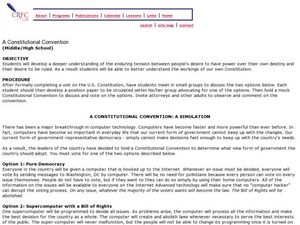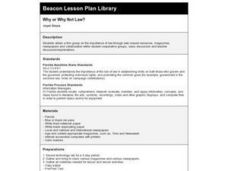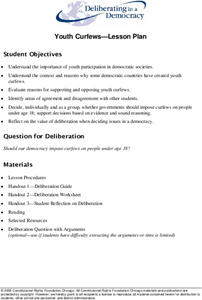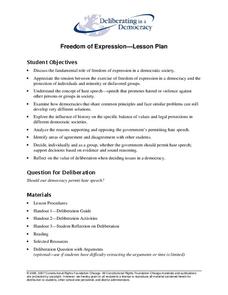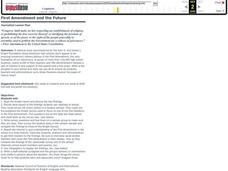Curated OER
Writing a Class Constitution
Pupils view a short play and explore the United States constitution relating it to the importance of rules in the classroom and in the community.
Curated OER
The Living Constitution
Tenth graders explore the Constitution as a "living document." After reading three specific cases, learners consider characteristics that make up a living document. In groups, they conduct guided research on each case. Pupils write a...
Curated OER
A CONSTITUTIONAL CONVENTION: A SIMULATION
Students discuss two computerized options to change the current U.S. government. In this Constitutional Convention lesson, students write a statement advocating for one of the choices and participate in a mock modern Constitutional...
Curated OER
Utah's Legislative Branch: How a Bill Becomes a Law
Seventh graders explain the steps by which a bill becomes a law. They research how a bill becomes a law within the three branches of Utah's government and synthesize their research and discussion in a classroom representation of government.
Deliberating in a Democracy
Youth Curfews
Don't stay out too late! Scholars analyze the need for youth curfews in a democratic society. They examine primary documents, case studies, and short video clips to form their opinions and take a position on the issue. Holding a class...
Heritage Foundation
The Powers of the Executive
Are executives as powerful as they sound? High schoolers find out about the US president and executive branch. A variety of activities include scaffolded reading sections, research assignments, and collaborative group work.
Deliberating in a Democracy
Freedom of Expression
Should democracies include hate speech as a protected right? Scholars analyze the rights found under the First Amendment to the Constitution through researching evidence. Freedom of expression becomes the focal point of the...
C-SPAN
Judicial Review and Marbury v Madison
The Supreme Court case Marbury v. Madison may not be widely recognized but the landmark case is particularly significant because it established the precedent for judicial review and that the Supreme Court had power as an interpreter of...
State Bar of Texas
Mapp v. Ohio
Do you have a search warrant? Scholars investigate the concept of illegal search and seizure through the eyes of the Supreme Court case Mapp v. Ohio. A short video clip along with paired group work opens discussion on the concept of how...
NPR
Same-Sex Marriage
The battle over same-sex marriage is a prevalent issue in the United States, and a valuable topic to be discussed in your social studies classroom. Here is a basic outline of introductory questions, focus questions, vocabulary, and media...
Museum of Tolerance
Documents That Shape Society
The Bill of Rights is a foundational document of American democracy, much like the Nuremberg Laws were a foundational document of the Reichstag of Nazi Germany. But that's where their similarities end. Engage high schoolers in a...
National History Day
Challenging the Status Quo: Women in the World War I Military
Why are some so resistant to change? The status quo is often to blame for a lack of forward movement in society. Following the events of World War I, women in America suddenly had a voice—and were going to use it. Scholars use the...
State Bar of Texas
Marbury v. Madison
Who has the final say in matters dealing with the rules under the United States Constitution? The case Marbury v. Madison brings to light the issue of judicial review. Learners investigate the Supreme Court's opinion in the case with a...
DocsTeach
Prohibition and Its Consequences
Organized crime and speakeasies ... just another day during Prohibition. An intriguing activity explores the world of Prohibition and its consequences on life in the United States. Scholars analyze primary sources and place them on a...
School Improvement in Maryland
Political Systems: Advantages and Disadvantages
Every political system has advantages and disadvantages. To gain an understanding of these differences, groups investigate the political system of another country—oligarchy, monarchy, dictatorship, parliamentary—and prepare a...
EngageNY
Studying Conflicting Interpretations: Perspectives on Plessy v. Ferguson: Part 3
Scholars closely read Justice John Marshall Harlan's dissenting opinion in the Plessy v. Ferguson case, seeking to understand why he disagreed with the court's decision that racial segregation laws for public spaces were constitutional....
Curated OER
Role of the Government
Namely through discussion, get your opinionated scholars examining the roles of government- is it even necessary? They analyze the quote: "To be free, one must be chained," writing what it represents and then sharing. Consider...
Curated OER
Legal Rights, the Charter, and Canada's Constitution
Students explore the issue of human rights in Canada and compare and contrast the Bill of Rights and the Charter of Rights and Freedoms. They debate whether Canadians are giving up certain democratic rights in exchange for the greater good.
Curated OER
Inspiration for and Application of the Bill of Rights
Learners examine individual rights. In this case law lesson plan, students discuss the from and function of the Bill of Rights prior to investigating several cases that deal with Constitutional rights. Learners discuss the outcome of the...
Curated OER
The Ongoing Debate: Crime Control v. Due Process Protection
Students investigate the Exclusionary Rule and other ways of to enforce the protections found in the Bill of Rights. They study how effective criminal control and public safety is carried out while citizens Constitutional rights are...
Curated OER
First Amendment and the Future
Students read the Knight report and discuss key findings before deciding what aspects of the findings students can replicate in their own school and conduct a survey. They write survey questions and test them on sample group before...
Judicial Learning Center
The Appeal Process
Why doesn't the Supreme Court hear testimony from witnesses? How do they complete an entire proceeding in less than two hours? A helpful lesson guides scholars of criminology through these and other questions by explaining how appeals...
Curated OER
Citizenship and the Constitution
Students identify government officials and resources on a local, state and national level. They determine the structure of local, state, and national governments.




